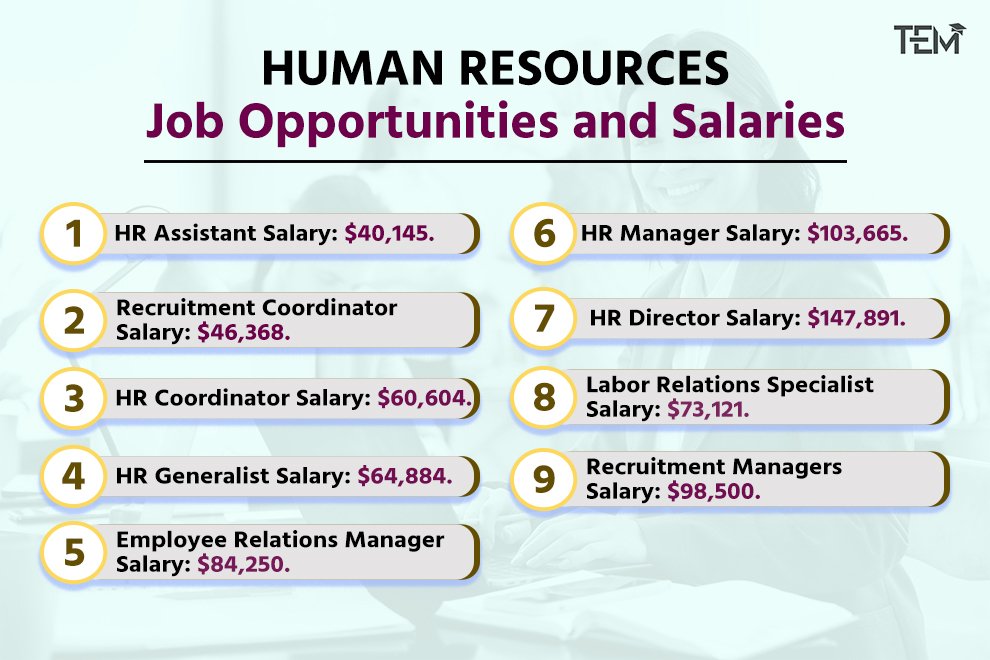Human Resources focuses on collaborating with individuals to enhance companies. These roles involve identifying suitable candidates for hiring, assisting employees in their learning and growth, and ensuring everyone experiences contentment at work. If you enjoy improving workplaces and helping people achieve success, a career in Human Resources could be an ideal match. In this field, you could develop job listings, conduct interviews with job seekers, devise training plans, and resolve challenges. Your efforts would facilitate smooth company operations and employee growth, making it a fulfilling path for those who value both people and business success. This blog will provide information about careers in Human Resources.
Key Responsibilities of an HR
Human Resources (HR) is the department within an organization responsible for managing various aspects of its workforce. HR’s responsibilities include:
- Recruitment and Hiring: HR professionals identify job openings, create job descriptions, promote positions, conduct interviews, and select suitable candidates for the organization.
- Onboarding and Orientation: HR facilitates the seamless integration of new employees by providing essential information, resources, and training for a successful start in their roles.
- Training and Development: HR organizes training programs to enhance employees’ skills, knowledge, and professional growth. These programs may include workshops, seminars, online courses, and mentoring.
- Performance Management: HR sets performance goals, conducts performance evaluations, and offers feedback to help employees improve their performance.
- Compensation and Benefits: HR oversees employee compensation, including salaries, bonuses, incentives, and benefits such as healthcare and retirement plans.
- Employee Relations: HR professionals handle employee grievances, conflicts, and concerns to maintain a positive work environment and resolve issues fairly and promptly.
- Compliance with Laws and Regulations: HR ensures the organization adheres to labor laws, employment regulations, and workplace safety standards to reduce legal risks and liabilities.
- Health and Safety: HR ensures a safe and healthy workplace by implementing safety policies, addressing workplace hazards, and providing resources for employee well-being.
- Employee Engagement: HR professionals work to enhance employee satisfaction and engagement through events, surveys, and initiatives that promote a positive company culture.
- Organizational Development: The HR department assists in strategic planning by aligning human resources with the organization’s goals, aiding in workforce planning, and adapting to changes in the business environment.
- Talent Management: HR identifies and nurtures the organization’s top talent by developing strategies for succession planning and leadership development.
- Technology: Due to technological advancements, HR departments increasingly rely on software solutions to manage tasks such as processing payroll, maintaining employee records, and tracking performance. Becoming familiar with the top companies offering HR software is therefore sensible if you want your career in this niche to flourish, since prospective employers will look for this base level knowledge.
Educational Qualifications Required for Careers in Human Resources
To pursue a career in human resources, specific educational qualifications are essential:
- A standard 10+2 education is the initial requirement to become an HR professional.
- Students may opt for the commerce stream during their junior college years.
- Bachelor’s and Master’s Degrees in Human Resource Management: These degrees directly prepare you for a career in HR. A bachelor’s degree in HRM provides a strong foundation in HR principles, labor laws, recruitment, training, compensation, and employee relations.
- Bachelor’s and Master’s Degrees in Business Management: These degrees offer a broader understanding of business operations, which can be advantageous for HR roles with a strategic focus, such as HR management or organizational development. These programs also introduce you to HR career opportunities and provide essential knowledge in HR principles, labor laws, recruitment, training, compensation, and employee relations.
- Bachelor’s or Master’s Degrees in Psychology or Sociology: While not HR-specific, degrees in psychology or sociology can offer valuable insights into employee behavior and workplace dynamics, making them useful for HR professionals seeking a deeper understanding of these aspects.
- Bachelor’s or Master’s Degrees in a Related Field with HR Experience: If you hold a degree in fields like communication, social science, or law and gain relevant experience in the HR field, your chances of success in this domain increase.
Curriculum Courses
Human Resource Management: This subject holds great significance for those pursuing HR studies, encompassing the historical context, role, and various functions within HR.
- Labor Benefits: This course delves into the legal framework governing labor relations, encompassing aspects such as collective bargaining and union-management relations.
- Employee Relations: This course focuses on the day-to-day management of employees, including HR’s responsibilities in performance management, disciplinary procedures, and workplace investigations.
- Compensation and Benefits: This course deals with the design and administration of compensation and benefits programs, encompassing aspects like salaries, wages, bonuses, and health insurance.
- Training and Development: This course addresses the design, delivery, and evaluation of training and development programs.
- Organizational Behavior: This course explores the behavior of individuals and groups within organizations, covering topics such as motivation, leadership, and decision-making.
- Strategic Human Resource Management: This course examines the role of HR in the strategic planning process and its contribution to achieving organizational objectives.
- Diversity and Inclusion: This course emphasizes the significance of diversity and inclusion in the workplace and provides guidance on creating a more inclusive work environment.
- Ethics in HR: This course underscores the ethical principles that should guide HR professionals in their work.
Complete Your Course with Certification
To enhance your journey in Human Resources careers, consider obtaining the following certifications:
- Professional in Human Resources (PHR): Offered by the HR Certification Institute, this certification is recommended for both seasoned professionals and newcomers to the field. It encompasses various HR functions, including recruitment, employee relations, compensation, and more.
- Senior Professional in Human Resources (SPHR): Also provided by the HR Certification Institute, these certificates hold particular significance for experienced HR professionals. They focus on strategic HR planning, organizational development, and compliance with legal regulations.
- SHRM-Certified Professional (SHRM-CP) and SHRM-Senior Certified Professional (SHRM-SCP): These certifications, offered by the Society for Human Resource Management (SHRM), align with the SHRM Body of Competency and Knowledge. The SHRM-CP is suitable for early-career professionals, while the SHRM-SCP is tailored for those in senior HR roles.
- Associate Professional in Human Resources (aPHR): Also available from the HR Certification Institute, this certificate is designed for individuals embarking on their HR careers or transitioning from other fields. It provides a solid foundation in HR principles.
- Certified Compensation Professional (CCP): Provided by World at Work, this certification centers on compensation and rewards management. It is invaluable for professionals specializing in compensation and benefits and is considered essential in the field.
- Certified Training and Development Professional: Offered by the Institute for Performance and Learning, this certification suits HR professionals who focus on employee training and development. It holds particular value for those new to the field.
- Certified Professional in Learning and Performance: Also available from the Institute of Performance and Learning, this certification is designed for professionals dedicated to improving learning and performance.
- Certified Diversity Professional: Provided by the Institute for Diversity Certification (IDC), this certification is highly valuable for HR professionals passionate about diversity and inclusion efforts.
Job Opportunities and Salaries

If you’re considering a career in Human Resources, here are various job opportunities along with their corresponding salaries to explore:
- HR Assistant: The primary role of an HR Assistant involves providing support to the HR manager and executive in various tasks. These tasks include composing job descriptions, verifying references, arranging interviews, dispatching employment contracts, managing employee records, handling compensation and terminations, maintaining the HR management schedule, organizing meetings and interviews, coordinating training and HR events, and generating HR reports. The average annual salary for this position is $40,145.
- Recruitment Coordinator: The main responsibilities of a Recruitment Coordinator include discovering qualified candidates, identifying job openings, crafting job descriptions, sourcing potential candidates, evaluating applicants, scheduling and assisting in job interviews, and presenting recruitment process reports to management. The average salary for this role is $46,368.
- HR Coordinator: HR Coordinators perform diverse administrative tasks for the HR department, collaborating with HR managers to manage recruitment, employee orientation, training, and employee records. They also evaluate employee performance, process payrolls, generate HR activity reports, resolve conflicts, coordinate meetings, organize interviews, and supervise HR events. The average salary for this position is $60,604.
- HR Generalist: Human resources generalists handle a wide range of responsibilities related to both internal and external human resources matters. This includes managing recruitment processes, providing staff training, fostering positive employee relations, developing company policies and guidelines, ensuring compliance with regulations, maintaining employee databases, preparing activity reports, and monitoring budgets and payrolls. The average salary for this position is $64,884.
- Employee Relations Manager: Employee Relations Managers are responsible for managing various matters concerning employee and company management relations to ensure a harmonious work environment. Their duties include processing employee complaints, offering counseling, resolving conflicts, collecting and analyzing employee feedback, and creating practices and programs to enhance employee relations. The average annual salary for this role is $84,250.
- HR Manager: Human resources managers carry out various crucial tasks, including overseeing a company’s recruitment process, evaluating candidates, conducting interviews with shortlisted individuals, making hiring decisions, organizing onboarding and training procedures, maintaining departmental records, assessing performance and wages, ensuring workplace health and safety, acting as intermediaries between executives and employees, and handling disciplinary measures and conflict resolution. On average, they earn a salary of $103,665.
- HR Director: HR Directors have the responsibility of overseeing the HR department, supervising employee recruitment, designing training programs, maintaining employee records, handling employee relations, assessing staff requirements, managing budgets, developing compensation plans, implementing HR strategies, and ensuring compliance with legal regulations. Their average salary is $147,891.
- Labor Relations Specialist: The role of a Labor Relations Specialist involves negotiating and bargaining on behalf of company management. They use labor laws, economics, and wage data to create precise proposals and regulations that facilitate smoother collective bargaining. Additionally, they offer advice to executive managers, prepare labor proposals and contracts, oversee labor relations programs, and resolve employee grievances and conflicts. On average, they earn a salary of $73,121 per year.
- Recruitment Managers: Recruitment Managers, also referred to as hiring managers, oversee the hiring processes within recruitment firms and corporations. They are responsible for identifying qualified candidates, organizing and conducting interviews, and ultimately making hiring decisions. Their responsibilities encompass utilizing recruitment software, overseeing recruitment databases, assessing hiring requirements, implementing efficient recruiting methodologies, and adhering to labor regulations. Additionally, they generate reports for company management and participate in industry events to establish professional connections. On average, they earn a salary of $98,500.
Conclusion
In the realm of Human Resources careers, you have the opportunity to enhance companies by facilitating the happiness and success of their employees. These roles encompass tasks such as identifying suitable candidates for the team, ensuring continuous improvement in job performance, and fostering a positive work environment. Opting for a career in Human Resources means you can simultaneously bolster both employee well-being and the company’s prosperity. It’s a means to cultivate exceptional workplaces for all!
ALSO READ: 10 Soft Skills for Students for Personal and Professional Growth (First one is very important!)










